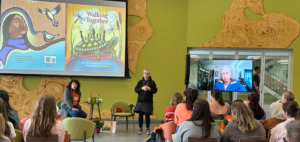“We share wonder as we wander” — authors speak at AC
Posted on Friday, September 29th, 2023
A group of close to 100 learners and employees came together on Thursday to listen to the authors of Walking Together: Two-Eyed Seeing and Land-Based Learning for an interactive and engaging session.
listen to the authors of Walking Together: Two-Eyed Seeing and Land-Based Learning for an interactive and engaging session.
Mi’kmaw Elder Albert Marshall and Humber College Professor Louise Zimanyi, who is of French-Canadian and Hungarian descent, addressed the crowd, discussing not only the importance of connecting to nature but how to incorporate and share that learning with young children. The crowd included Early Childhood Education program students who also participated in an engaging reading of the new book.
“Lots of our brothers and sisters have lost their relationship to the land and we are searching to see where we can find a normalization of people that are helping people to reconnect with nature,” said Marshall. “To connect with nature we have to be in a relationship with it. Know the beauty, know the creatures and why they are there. Each creature has a purpose. We need her more that she needs us.”
After Marshall spoke, Zimanyi engaged the group for the storytelling portion. Participants formed a circle and each selected an animal of their choice. Ravens, eagles, frogs, trout and butterflies each joined the activity.
As participants took turns reading the pages of the colourful and moving story, birds chirped and tweeted, frogs ribbeted and butterflies fluttered amongst the crowd.
One of the profound verses in the story includes
“We are never alone.
We need each other.
Mawikwayk. Together we are strong”
Zimanyi asked the crowd “what do you see” to draw attention to animals, nature and the two-legged and four-legged in the story.
Marshall and Zimanyi’s collaborations have also resulted in the creation of the Two-Eyed Land-Based Play and Co-Learning program at Humber College, “aiming to shift post-secondary early childhood education training, in-service professional development and early years programming to advance a Two-Eyed pedagogy of land-based play and co-learning.” The course is titled Land-Based Play and Co-Learning through Etuaptmumk/Two-Eyed Seeing that braids the strengths of both Indigenous and non-Indigenous perspectives.
More information about the book can be found at this link.
- Posted in
- Words
- Tags: